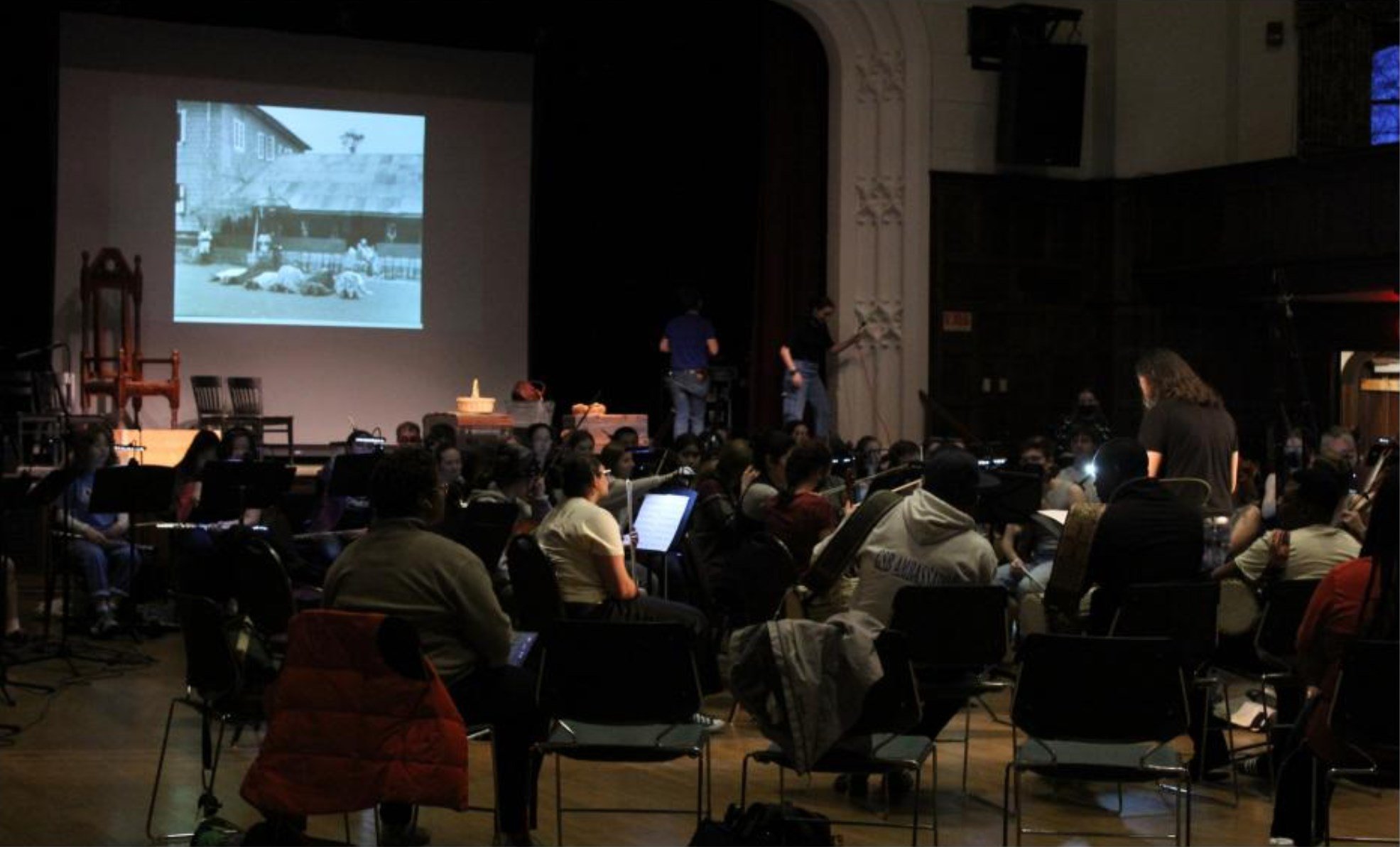Photo by Tara Monatesse '25. Mount Holyoke Orchestra Director Tianhui Ng conducts the pit during a rehearsal of "Funmilayo," an opera about activist Funmilayo Ransome-Kuti.
By Lucy Oster ’23
Arts & Entertainment Editor
Nobody ever wants to pay taxes. The sentiment is in the air — April 18 is Tax Day! — as well as the arts. “Funmilayo,” the fourth production in the African opera series at Mount Holyoke, explores just one moment in the rich life of Funmilayo Ransome-Kuti: when she fought British colonial rule in what is now present-day Nigeria through protests against a special tax imposed on women in the 1940s.
“Funmilayo” was written, composed and produced by Olabode Omojola, the Hammond-Douglass Five College professor of music, and debuted on April 8 and 9 in Chapin Auditorium. As an opera, the show shares Ransome-Kuti’s real-life story through a variety of means: the classic symphony orchestra and singing expected from Italian opera, as well as West African drumming and dancing. The production also featured many types of performers, including professional actors and students from Omojola’s African Opera in Performance and Practice class. Even the audience was diverse, featuring locals from around South Hadley as well as Mount Holyoke students.
Omojola’s African operas, which he has been producing at Mount Holyoke since 2008, are intentionally a cultural mix. They are also personal to the professor. “By my own training, I studied traditional African music, I studied Western classical music … So with this kind of bicultural and bimusical experience I felt I could use a medium that reflects my own experience, but also reflect contemporary experiences in Nigeria and even in the colonial era,” he stated about his work.
“By my own training, I studied traditional African music, I studied Western classical music … So with this kind of bicultural and bimusical experience I felt I could use a medium that reflects my own experience, but also reflect contemporary experiences in Nigeria and even in the colonial era.”
“Funmilayo” is relatively simple in its storyline. The opera follows Funmilayo and her supporters singing at the king, Oba Alade, of Abeokuta to lessen the taxes on women. This involves Funmilayo labeling the king as a ‘stooge’ of the British, an observation that is then confirmed in a song that starts with Oba Alade singing before seamlessly transitioning to the British colonial officer. The lyrics say, “The king cannot be questioned,” with the Alake referring to himself and the colonial officer referring to the British king at the time, depicting how the British are manipulating the leader into a colonial pawn.
Graphic courtesy of Summer Redko.
Funmilayo consistently and clearly analyzes the situation in monologues accompanied by dance. At one point she makes a feminist reading of the situation, arguing that women shouldn’t be taxed due to the amount of upkeep they do in their families, and, therefore, their communities. Funmilayo is the obvious hero of the opera, and her insistent and didactic demonstrations eventually cause the Alake to abdicate the throne.
Omojola stated that part of his inspiration for writing “Funmilayo” came from Mount Holyoke itself. “I’ve been trying to look at themes that resonate with Mount Holyoke’s mission […] and objectives, especially about the role of gender groups that are usually underrepresented or subdued or repressed,” Omojola explained. Funmilayo is a strong woman, and the show sets her up as an important leader in her community.
The simplicity of the plot means that the opera excels in its lyricism and music. The orchestra and choir had students from Mount Holyoke as well as outside of the College and was conducted by Chair of Music, Dance and Film, Media, Theater Tianhui Ng, who shared that there were “about 40” students in the orchestra, and the effect of that musical presence is felt during “Funmilayo.”
The production of “Funmilayo” is connected with Omojola’s African Opera in Performance and Practice class. The class, which is a regular 4-credit class, starts in January with a contextual basis. Omojola said the first few weeks involve “talking about historical issues, cultural issues, musical traditions in Africa, colonial rule in Africa, preparing the cultural-historical intellectual background to engage with a work of art.”
The class then transitions from theory to practice. That means the class goes from a two times a week commitment to a lot more, with Omojola saying that the week before the performance that the students “were in Chapin Auditorium at least for three hours every day so that gives you 21 hours, which is maybe [a total of] seven weeks of class?”
Carissa Barry-Moilanen ’23, who stage-managed “Funmilayo,” said that it was “a highly highly intensive process” and that “when we finally came together for that final week and when we got all the tech and the orchestra and the chorus and the actors and the costumes and everything involved it became a really beautiful piece of art that I am proud to have been a part of.”
That magnificent effort is present in all aspects of the production. It is clear that the actors are giving it their all, and the entire production is clearly highly involved, requiring an intense level of dedication. The costuming, done by Omojola’s wife, is subtle yet elaborate. The choreography was magnetizing and worked well with the music. There were many scenes, such as the overture and the anticolonial dance near the end, where actors danced to the orchestral music without dialogue for a considerable length of time.
Kiera Myrthil ’24, who played Funmilayo for the April 8 performance shared that they felt “very honored to have premiered this opera of [Bode’s]. The storytelling, the tension and conflict resolution is so beautifully done in the score that the dialogue almost seems unnecessary. There is also so much to be said about the intention put into every piece.”


